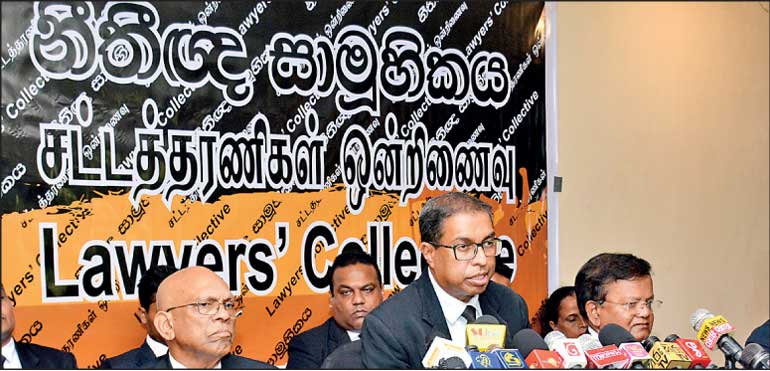Wednesday Feb 18, 2026
Wednesday Feb 18, 2026
Saturday, 27 July 2024 00:00 - - {{hitsCtrl.values.hits}}

Ex-BASL Chief Saliya Peiris PC speaks at the media briefing organised by the Lawyers Collective yesterday – Pic by Upul Abayasekara
The Bar Association of Sri Lanka (BASL) former President Saliya Peiris yesterday warned any Government stance rejecting the Supreme Court’s order on the appointment of the Inspector General of Police (IGP) will deal a significant blow to the rule of law and democracy.
“Such a move could propel the nation towards dictatorship,” Peiris alleged.
Taking to his social media account, Peiris said despite potential Government claims to the contrary, Deshabandu Thennakoon, the suspended IGP, holds no right to continue in his role. Peiris said continuing to function as IGP will expose him to personal contempt of court charges. Additionally, any actions or orders contradicting the Supreme Court’s directive will lack legal validity in the long term.
Peiris is also representing one of the nine parties that have filed a petition against Thennakoon.
Peiris highlighted historical instances of high-level political efforts to circumvent court orders. He cited the 1980/81 case when the Court of Appeal unseated Kalawana MP Abeyratne Pilapitiya.
“The MP secured a Speaker’s ruling to remain in Parliament despite the court’s decision, prompting the Elections Commissioner to proceed with a by-election. The then-President J.R. Jayewardene introduced a constitutional amendment to allow two representatives for Kalawana, an amendment deemed by the Supreme Court to require a referendum. Ultimately, Pilapitiya resigned, and Sarath Muttettuwegama of the Communist Party took his rightful seat following the by-election,” he recalled.
Peiris said while recent developments indicate that President Ranil Wickremesinghe has informed the Speaker that he will abstain from appointing an acting IGP, citing advice from his legal team regarding potential election petitions, Peiris criticised this as another shameless attempt to bypass the court order. He highlighted the President’s constitutional duty to make necessary appointments irrespective of upcoming elections. Peiris asserted that failing to do so constitutes a dereliction of duty, suggesting that the President should temporarily step down if unable to perform these essential functions.
Peiris also refuted several Government claims and said the assertion that the Constitutional Council is not subject to Supreme Court jurisdiction is false. He noted that Article 41 (J) of the Constitution makes the Council subject to the Fundamental Rights jurisdiction of the Supreme Court, as confirmed by a seven-judge bench in 2002.
“The claim that the Constitutional Council is an extension of the legislature is incorrect. Despite having seven Parliamentarians, the Constitutional Council performs an executive function and is categorised under the Executive in the Constitution,” he noted.
Commenting on the IGP appointment he said it is the President who nominates a candidate for the Council’s approval, not the other way around.
“The President’s appointment powers, excluding the power to declare war and peace, are subject to Fundamental Rights jurisdiction following the 19th Amendment,” he noted.
According to Peiris, the current situation reflects an outrageous attempt by the Executive to disobey a court ruling and retain an individual barred by the court.
“Neither the Prime Minister nor the Speaker can legally overrule the interim orders regarding the IGP. If the IGP defies the Supreme Court order, he will face contempt charges. Any police officers acting on orders from Thennakoon will be executing illegal directives and will also face legal consequences,” he warned.
Holding a press conference on the issue, Peiris representing the Lawyers Collective also questioned if the President will not appoint an Acting IGP at this juncture if the serving IGP became critically ill and unable to function in the role. “Will they then maintain that the IGP post has not become vacant and refuse to appoint an Acting IGP?” he asked. “There are ample provisions to appoint an Acting IGP,” he added.
He said if the President is unable to intervene in this matter due to his candidacy, then there are provisions to appoint an Acting President to carry out his duties.